14 Mar God, Baseball, and the Beach in Nicaragua
Steve Dennie, Communications Director
Baseball is the national sport in Nicaragua. Soccer reigns in most Latin American countries, but baseball is king in Nicaragua. And in Panama, Cuba, and the Dominican Republic, for that matter. But this is about Nicaragua.
One day last September, two United Brethren ministers showed up after a Huntington University baseball practice. Are you interested in spending January Term in Nicaragua? they asked. Playing baseball against Nicaragua teams and holding clinics for children?
Austin Clem, a freshman from Walton, Ind., population 1200, felt apprehensive about the idea. He had never traveled out of the country, except for a cruise, which hardly counts. He knew Nicaragua had experienced turmoil in the past.
“It was out of my comfort zone, not in the American culture I knew and loved,” Austin said. “But I felt I needed to go, that I belonged there.”
It helped that a bunch of his teammates also signed up. Twelve of them, in fact, seven of them freshmen. They were joined by five soccer players—four current players, and one recent graduate, Isaac Beal. Plus those two ministers, both of whom participated on a previous baseball trip in 2012.
Jeff Dice is associate pastor of Brown Corners UB church in Clare, Mich., and also spends a chunk of each year in Nicaragua coordinating mission trips, among other things. He and his wife, April, are “non-traditional” staff with Global Ministries.
Josh Kesler is founding pastor of The Well, one of the three UB churches in Huntington. He’s also an assistant coach with the Huntington University soccer team. Josh did most of the legwork in getting guys signed up for the trip.
There was no hesitation from Dustin Rutledge, a catcher. He went in 2012—the only current student to return.
Dustin grew up in Frankfurt, Ind., in a very religious family. However, his parents separated when he was young, and the family strayed from the church for about five years. But toward the end of his high school years, they reconnected with church.
“When I was younger, I didn’t really understand everything about my faith,” Dustin said. “But when we returned to church, I was getting it figured out. I think God wanted me to come to Huntington to expand on it and become a follower of him.
“I proclaimed my faith the first time we went to Nicaragua. Shortly after returning, I was baptized by Josh at The Well, along with other athletes. I’ve stayed connected with God, and have continued to grow and build my relationship with him.”
Dustin couldn’t wait to revisit Nicaragua. Through Facebook, he’d kept in contact with some of the people he met there in 2012, especially two guys they played baseball against.
“They expressed a great desire for us to come back. I couldn’t pass up the opportunity to make an impact not only on them, but on my teammates.”
Dustin shared his experience with the other players, describing what they would experience and the changes that would occur in their lives. Eleven other players signed up. Including a skeptical, semi-reluctant Clem Austin.
The temperature was -5 degrees, with a foot of snow on the ground, when they left Indiana. They arrived in Managua late at night, and walked into what felt like an oven, in the mid-80s.
An open-sided truck awaited outside the terminal. Young kids tossed their bags into the bed, and then hopped in. The baseball players followed in a school bus. It took about 90 minutes to reach Masaya, where the clinics would be held. Then the bus took a bumpy 30-minute trip up into the mountains to their home for the next 11 days, Rancho Ebenezer.
Rancho Ebenezer, a fully operational farm, was started in 1998 by a Nicaraguan agricultural economist with strong support from Christian groups in the United States. They teach poor farmers from remote mountain villages how to not only survive, but to thrive on a small piece of land using the resources readily available to them. The farmers come to Rancho Ebenezer and learn advanced agricultural techniques suitable for their context. In addition to valuable training in subsistence farming and animal husbandry, each farmer receives, free, a stock of animals and chickens to raise and breed.
Secondary projects include health clinics and village farm development, and they plan to add reforestation and fish farming as funds enable. The large complex includes a veterinary clinic and lab. Over 20 persons work fulltime at Rancho Ebenezer. Rancho Ebenezer is 90% self-supporting, thanks to the Managua restaurants which buy their livestock.
The three dormitories can accommodate 40 persons. Various groups, including mission teams, use the facilities. Jeff Dice likes using Rancho Ebenezer for youth groups. It costs less than $15 per day for a night’s lodging, breakfast, and dinner.
The baseball team arrived Thursday morning at 1 am.
“The smell of Rancho Ebenezer will probably haunt me forever,” said Austin. “It’s a mix of various animals—goats, pigs, bulls, rabbits. My room was next to the goats. You could hear them all hours of the night.”
The first few days, another group was using the building with outdoor plumbing, so the baseball team had the pleasure of using outdoor plumbing. “There were bats hanging in the bathrooms,” Austin recalled, not fondly.
After a night’s sleep, the team spent the rest of Thursday getting acquainted with the surroundings and preparing for the first baseball clinic, which started Friday morning.
The clinics were held at Roberto Clemente Stadium, located next to the lake in Masaya. Roberto Clemente, a Puerto Rican who played 18 seasons with the Pittsburgh Pirates, ranked among the best players of his generation, and became the first Latin American inducted into the Baseball Hall of Fame. After a massive earthquake struck Managua in 1972, Clemente helped arrange three emergency relief flights. 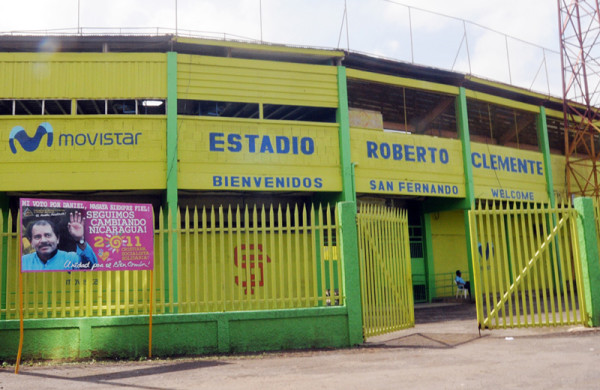 Upon learning that relief supplies from all three flights had been diverted by corrupt officials of the Somoza dictatorship, never reaching earthquake victims, Clemente decided to personally accompany the fourth relief flight. That flight, an overloaded DC-7 with a history of mechanical problems, crashed in the ocean immediately after take-off. Clemente remains a national hero in Nicaragua.
Upon learning that relief supplies from all three flights had been diverted by corrupt officials of the Somoza dictatorship, never reaching earthquake victims, Clemente decided to personally accompany the fourth relief flight. That flight, an overloaded DC-7 with a history of mechanical problems, crashed in the ocean immediately after take-off. Clemente remains a national hero in Nicaragua.
“Baseball is the most popular sport in Nicaragua, and the heart sport,” says Jeff Dice. “Every country has a sport that cuts to the heart, and baseball is it. Many people play soccer, because all you need is a ball and a couple rocks for goals. But in Nicaragua, you see just as many kids playing stickball in the street. Even adults, my age, are out playing stickball.”
Nicaraguan baseball dates back to 1887. At the time, Great Britain occupied Nicaragua, and they formed local cricket teams. An American businessman named Albert Addlesberg, who lived in Nicaragua, found cricket confusing. He convinced two cricket teams to switch to baseball, and he imported baseball equipment from New Orleans.
The sport was further popularized by US Marines, who invaded Nicaragua in 1909 and occupied the country until 1933. In the 1930s, barnstorming teams from the American Negro leagues frequently traveled through Nicaragua; many players stayed to teach Nicaraguans the fundamentals.
A pro league began in 1956. It shut down for financial reasons in 1967, but relaunched in 2004. Today, baseball flourishes. To date, 13 Nicaraguans have played in Major League Baseball (three currently). The most famous Nicaragua baseball player, and arguably the best, was Dennis Martinez, a former pitcher with the Montreal Expos. In 1991, he pitched the thirteenth perfect game in Major League history.
The national stadium, rebuilt after the 1972 earthquake, was named in honor of dictator Anastasio Somoza. After the Sandinistas overthrew the Somoza family in 1979, the stadium was renamed in honor of the man who assassinated Somoza. In 1998, the stadium was renamed yet again–Dennis Martinez National Stadium. Martinez, a former pitcher with the Montreal Expos, is the most famous Nicaraguan baseball player.
The baseball clinics are a partnership between Global Ministries and the city of Masaya. The United Brethren work in Nicaragua is headquartered in Masaya, the country’s third largest city, with about 130,000 people. Jeff went to Nicaragua in October with Jeff Bleijerveld to do small business training. During that visit, he met with folks from the mayor’s office and gave them a sample schedule. They then wrote up an agreement—what they would provide, what we would provide, the expenses involved. It all came together nicely.
The Americans have informally committed to taking a team to Masaya every two years. “In the future, it may just take an email to arrange a trip,” Jeff says. “Working with officials in Nicaragua is pretty easy. They’re open to creating those partnerships.”
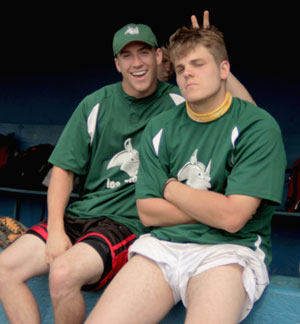
That first baseball clinic on Friday and Saturday targeted kids ages 12-15. As before, the city had contacted local baseball coaches, who then brought their teams to the clinics—about 50 kids each day.
The baseball players divided up into different stations—hitting, pitching, infield, outfield, bunting, and base-running. Kids spent about 20 minutes at each station, learning that skill with the assistance of translators. Then they rotated to the next station.
Meanwhile, the six soccer guys conducted a soccer clinic in the outfield with 15-20 kids. Although a few soccer players went in 2012, they didn’t hold clinics, so this was new. Josh Kesler joined four current HU soccer players, plus Isaac Beal, a recent HU grad who played soccer. Isaac was part of the 2012 trip.
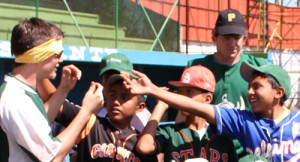 That was Friday. On Saturday, they split the kids into two teams and let them scrimmage. The Huntington folks umpired all of the bases, acting silly, wanting the kids to have a good time.
That was Friday. On Saturday, they split the kids into two teams and let them scrimmage. The Huntington folks umpired all of the bases, acting silly, wanting the kids to have a good time.
Dustin Rutledge said, “Halfway through the day a member of the team gave a testimony about how he first became connected to God. We wanted to help kids understand how God is there for us on a regular basis, inside and outside of baseball.”
Jeff Dice says the culture is very open about discussing God and faith. “For many of the young people who come to our clinics, God is not a new topic. We try to personalize what we share, try to make a connection that crosses cultural boundaries. We encourage guys to share how God has personally impacted their lives. It seems to go over well.”
It helps to have a great translator, and they do. His name, appropriately, is Jesus (hay-soos). Jeff has worked with Jesus for seven years now. He’s a Christian, but not United Brethren. “He does a wonderful job of not only translating the testimony, but making it culturally appropriate. He has a very good filter. So we are the attraction, these gringo ball players who share their testimony. Then Jesus transitions into an application for the kids’ lives.”
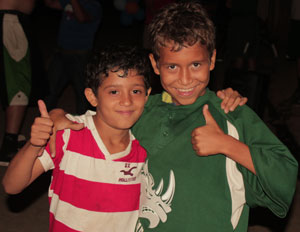 On Monday and Tuesday, they did the same thing with younger kids, ages 8-11.
On Monday and Tuesday, they did the same thing with younger kids, ages 8-11.
Austin was the base-running coordinator and coached scrimmages. “I’m the enthusiasm guy, making sure everyone is having a good time. Those were long days—up at 7am, and you don’t get to bed until midnight. It was tough to stay enthusiastic. You have to remember what you’re doing it for—for the kids, to show them that God can work through baseball.”
The clinics occupied just three hours each morning, 9:00 to noon. Then the team ate lunch with Juan Pavon, superintendent of Nicaragua Conference.
“Juan Pavon,” said Austin, “is probably the best cook I’ve met in my life. Every day, it was awesome. His fish, the tacos….”
Juan Pavon once operated his own open-air restaurant. It went great…when he was present. But as superintendent, he had to travel a lot, and things just didn’t work out. But he enjoyed sharing his culinary expertise with the visitors from El Norte.
They did something new this time—a community project. The team spent three afternoons working to revitalize a decrepit sandlot field on a piece of city-owned downtown property a few blocks from the market—not the worst neighborhood in town, but not the best. The field was little more than a cow pasture. Jeff Dice remembers watching games there while big-horned steers grazed in the outfield. Players chased down fly balls while dodging cattle.
The pitching mound was pretty much non-existent, so they rebuilt it. They measured off the distances to home plate and between bases, and set posts for the bases. They cleared out weeds and did general cleanup. The fencing was in disrepair, and players had no benches to sit on. Kids who played there came to hang out with the gringos. They were delighted to get a new ball field.
Parents and neighbors, excited that somebody was coming to revitalize this little league park, joined in. Even after the baseball team left, they continued the work for another 6-7 days. New fencing was put in. Roofs for the dugouts. Benches for players to sit on.
That project took up three afternoons. Other days, they held practice to prepare for the spring Huntington University baseball season. It was great being outside, under the hot sun in 90 degree weather, fielding balls on real grass rather than on the rubberized floor in the fieldhouse back in Huntington.
During three of the evenings, the soccer players participated in a four-team round-robin. They played a modified soccer game, six-on-six, under the lights on a field with artificial turf.
And four nights, the players competed against Nicaraguan teams.
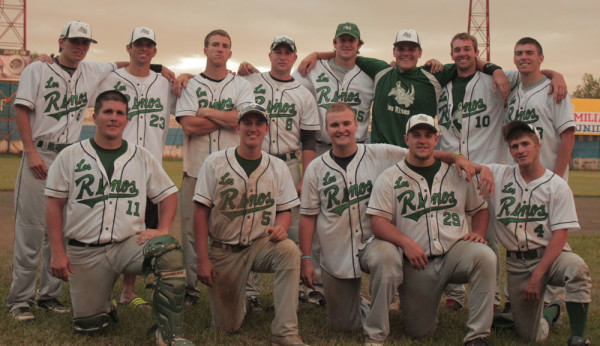
The team. Dustin Rutledge and Austin Clem are in the front row–Dustin on the far left, Austin in the middle.
They played four games against the pro team from Masaya, the San Fernando Giants. They use the same logo as the San Francisco Giants. The Huntington team won two, and lost two.
Here’s how pro baseball works in Nicaragua. At the top is a four-team winter league which plays October – January. These are all professional players, the cream of the crop. Beneath them is a 16-team league akin to our Triple A minor league system. The San Fernando team in Masaya is one of those 16 teams. The skill level is slightly above that of a US college player.
January is spring training for San Fernando. They usually invite 50 guys to try out for the team. Probably ten of them are already signed to contracts, so they know they have a spot. Several may actually play on one of the pro teams in the winter league. The other 35-40 are competing to make the team. They’re the ones the HU guys played against.
“It wasn’t all fun and games,” Jeff said. “These guys were serious about making the team, which is a paid gig. They can earn a modest living.”
For one of the games, San Fernando fielded some of their best players—a pitcher who threw harder than their other pitchers, and hitters who were larger and more skilled. That game, Jeff says, was more serious than the other games.
They also played a double-header against a team of hand-selected teens from throughout the country, sort of a little league world series for 16-and-under Nicaraguans.
The first game was played more for fun. Josh Kesler and the other soccer guys played. Jeff Dice played some first base. Some pitchers had pitching experience, some didn’t; Dustin Rutledge, a catcher, pitched two innings. The other team’s coach pitched a little, and another coach played in the field. It was a fun game. The HU team lost by a run in the last inning.
The second game was more serious. HU put in their best players. “Our guys one that one pretty easily,” said Jeff.
For their age, they were excellent players. Said Dustin, “They were the equivalent of teams we play in the summer and fall to amp up for our season. It’s good for us to see serious competition.”
We grew crazy-awesome relationships with some of the players,” Dustin said. “We were able to share how Christ can work in our lives, and see them grow as they realized why we were there. By the time we left, we exchanged uniforms with the guys we had gotten to know, to show our respect for how well they played and how they go about life.”
Austin plays first and third bases, but he’d had knee surgery in October—the most recent of a number of knee surgeries going back to fourth grade. He’ll miss the 2014 season at HU. In Nicaragua, Austin mostly took the designated hitter role. “I hit okay,” he said. “But for me, it was more about the team camaraderie. Seeing how well the guys were doing, it made me excited for the season to start, so I can be their number one fan.”
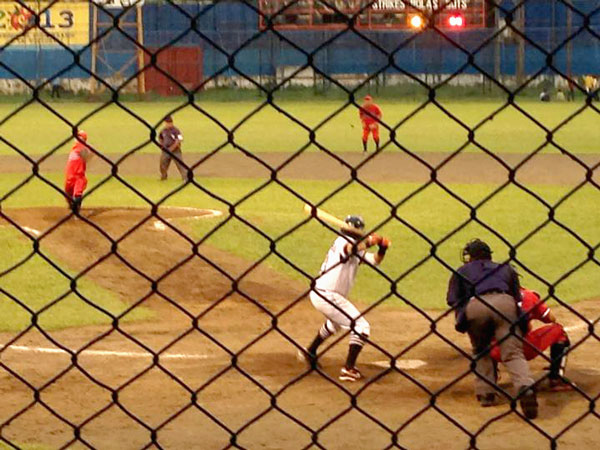 One memorable Nicaraguan player was Freddy Chavez, a 6’8” guy who in 2012 attracted the nickname “Goliath.” In 2012 Derrick McKinney, an ace pitcher for HU, threw a 3-2 pitch to Freddy which, a teammate later wrote, “is still on its way to Costa Rica.”
One memorable Nicaraguan player was Freddy Chavez, a 6’8” guy who in 2012 attracted the nickname “Goliath.” In 2012 Derrick McKinney, an ace pitcher for HU, threw a 3-2 pitch to Freddy which, a teammate later wrote, “is still on its way to Costa Rica.”
“He didn’t hit nearly as well this time,” said Dustin, “but the power he puts behind a baseball is astronomical.”
He recalled Freddy coming to bat with a man on first. The runner wouldn’t lead off the bag, because Freddy tends to pull the ball and there’s no time to get out of the way. The runner clung to first base until after Freddy’s swing. And good thing he did. Freddy hit between first and second bases, hard enough to take a runner’s head off.
“It was fun seeing him again,” said Dustin. “He’s 38 years old. We had his son in our baseball camp. I think he’ll be just as big as his dad someday. He’s just 13, but already stands 6’3.”
Austin: “I found Jesus while I was in Nicaragua.”
The 2012 trip grew out of a Bible study group Josh Kesler led with some of the college baseball players. This year’s group was very different, and much less grounded.
“I think only two were upper-classmen, the others were freshmen and sophomores,” Jeff Dice said. “Josh and I had that in mind as we talked about devotional times, what direction we wanted conversations to go. We knew there would be opportunities for spiritual growth among the players.”
Like Austin. He grew up in a Christian, church-going home, but he never understood God in a personal sense. When Austin began playing on traveling baseball teams, weekend tournaments replaced church. “I still believed in God, but didn’t make time for him like I should have,” he said.
Josh led a devotional time that first Sunday night in Nicaragua. He preached, and there was some singing.
Austin recalls, “Josh Kesler challenged us to proclaim that we believe Jesus rose from the dead—to say it out loud. When I said it, I had a tingling sensation all through my body. We sang after that, and I start bawling. I knew it was a presence of God like I had never felt before. When this happened, the weight and worry and anxiety of coming to Nicaragua, being out of my comfort zone, went away.”
Another devotional came on Wednesday night. Josh told the guys, “We’re going to the beach on Saturday. If you don’t know Christ as your Savior and would like to be baptized in the Pacific Ocean, let us know.”
Jeff says, “We went into it thinking four guys would be baptized. Those four had already made commitments to Christ, but had never been baptized. We could tell, from the unity of the group, that the Spirit was moving.”
Josh gave a sermonette on the beach and invited guys to be baptized. One by one, guys kept coming—12 guys in all. Josh baptized them all in the Pacific Ocean.
Among them was Austin Clem. “I was baptized when I was younger, but I didn’t feel what I felt in Nicaragua,” he says. “It was impactful for me to be rebaptized there.”
And then there was Joey Newberry.
Josh Kesler actively recruited three of the soccer players–twins Phil and Paul Holiday, from Dayton, Ohio, and sophomore Joey Newberry. He had lunch with the three, telling them he thought it was important that they go to Nicaragua with him. All three agreed to go.
Josh asked Joey if he was a Christian.
“No,” Joey said.
Josh responded instinctively, “You will be.”
“I’m not usually this bold, so my words surprised even me,” Josh says.
He immediately began praying for Joey. “My prayers were consistently about Joey surrendering his life to Christ, and I deeply wanted to baptize him in Nicaragua. I kept asking God to work on Joey’s heart so that I could baptize Joey in the Pacific.
“When Joey stepped forward in the ocean that day, I could not contain my emotion and literally raised my hands in the air and cheered at the top of my lungs. I asked God if I could baptize one person, and God showed me how great He is when 12 stepped forward, including another young man named Michael Kempton who had not until that moment repented of sin and confessed his belief in the Risen Lord.
“Two more followers of Jesus walked out of the ocean than walked in. It was an amazing day.”
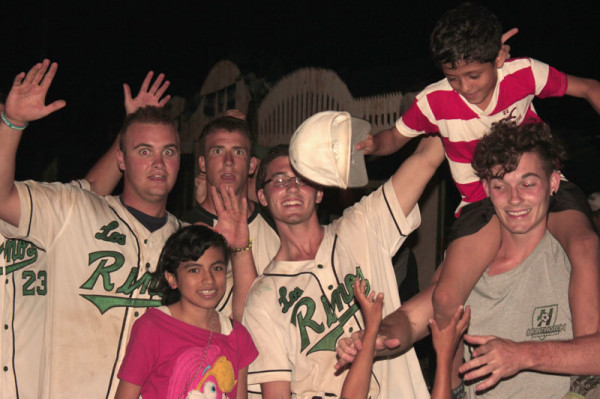
[dropcap style=”font-size: 60px; color: #37b7bc;”] T [/dropcap]hese baseball trips include a little bait-and-switch on God’s part.
Dustin explains: “When you sign up for this trip, it’s to show Christ to the kids. But the reality is that God is working through you and guiding you to a path where you can find yourself in him. You’re not expecting that. I hope I impacted the lives of kids, but God impacted me, and I think that’s the real reason I went.
“The first trip, I experienced what most of the guys experienced—the impact God can have on us personally. While we’re working for him, he’s working in us. It’s neat to see that.
“This time, we didn’t already know everybody in the group. We had seven freshmen, so most of the older guys had only known them for the first semester. In Nicaragua, the group grew together and worked as one to accomplish the mission at hand. It was incredible to see this group, so different from the group in 2012, come out so united.”
Dustin adds, “We went to help kids, but God had so much more on the agenda for us than we could imagine.”
Austin Clem will tell you the same thing.
- With the HU baseball team in Nicaragua.
- The soccer players played a night-time six-on-six game.
- The soccer players played a night-time six-on-six game.
- With the HU baseball team in Nicaragua.
- Clowning with some of the kids.
- With the HU baseball team in Nicaragua.
- With the HU baseball team in Nicaragua.
- Jeff Dice and a Nicaragua player.
- Jeff Dice with Jason Palacios, one of the professional players on the San Fernando team.
- With the HU baseball team in Nicaragua.
- With the HU baseball team in Nicaragua.
- With the HU baseball team in Nicaragua.
- With the HU baseball team in Nicaragua.
- Some batting practice.
- With the HU baseball team in Nicaragua.
- The umpire agrees with Dustin–“Safe!”
- With the HU baseball team in Nicaragua.
Photos by Henry P. Maynard, a sophomore at Huntington University.

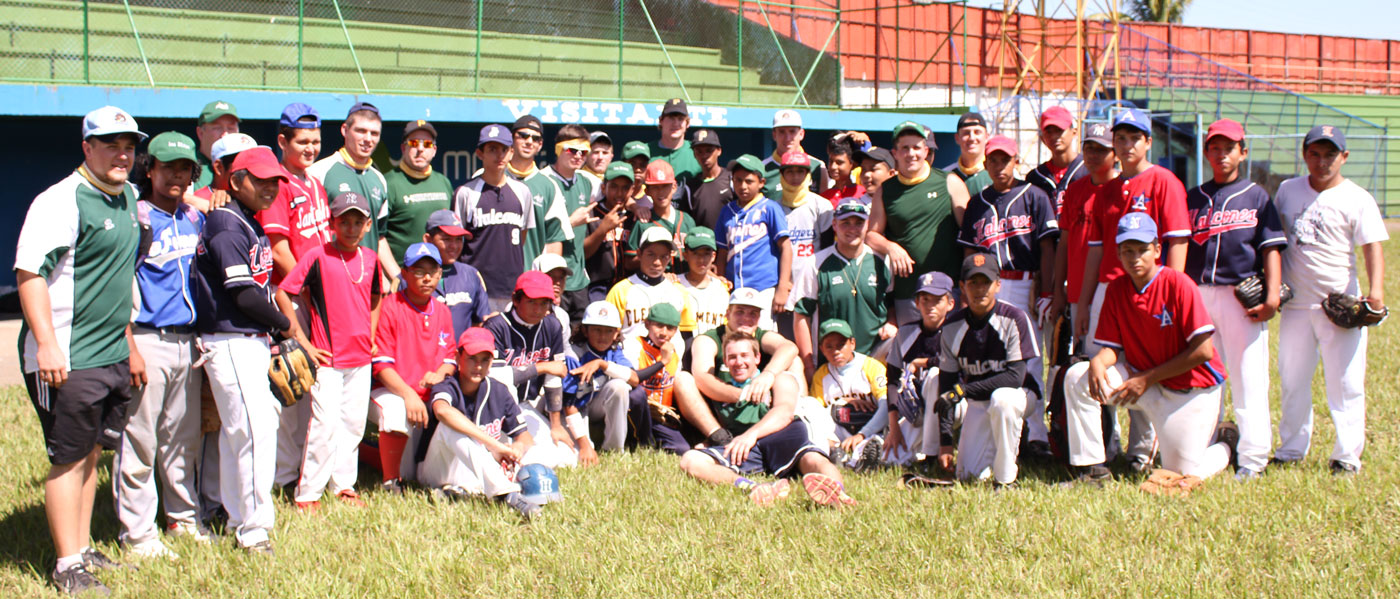
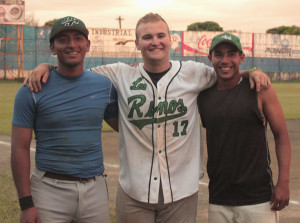

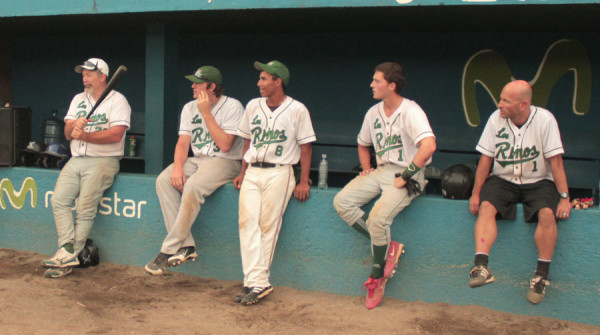
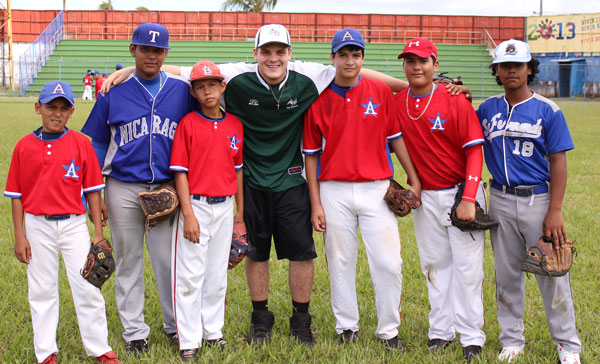
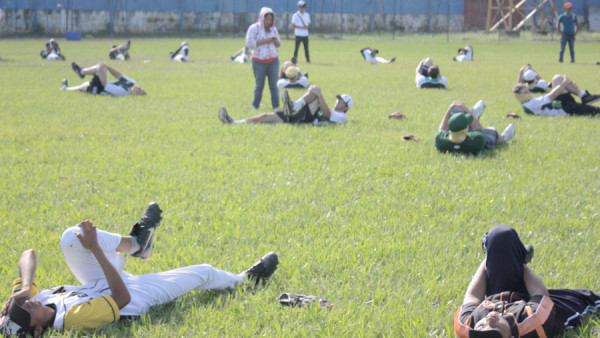
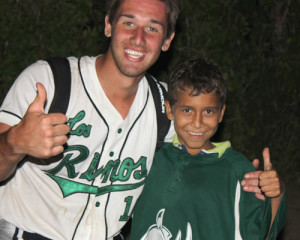
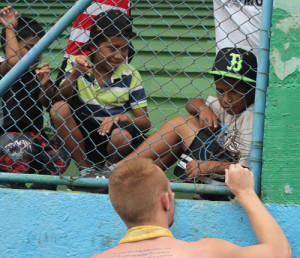
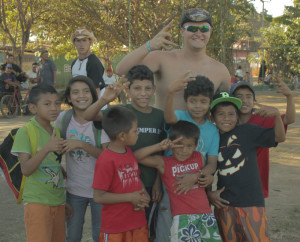
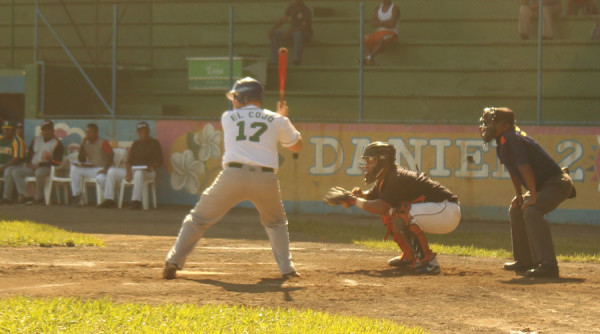
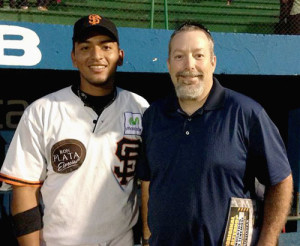
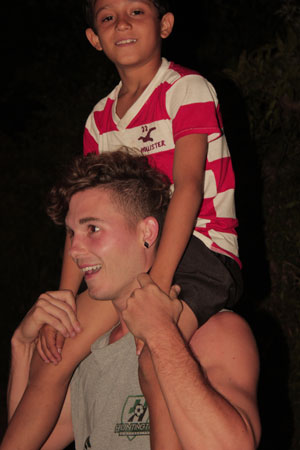
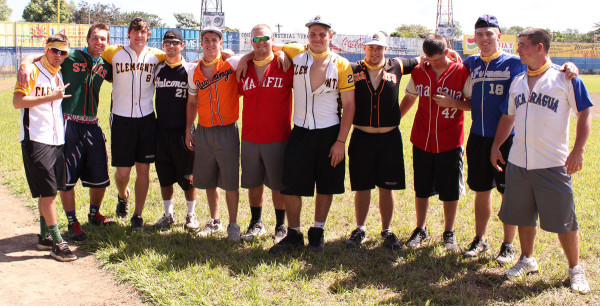
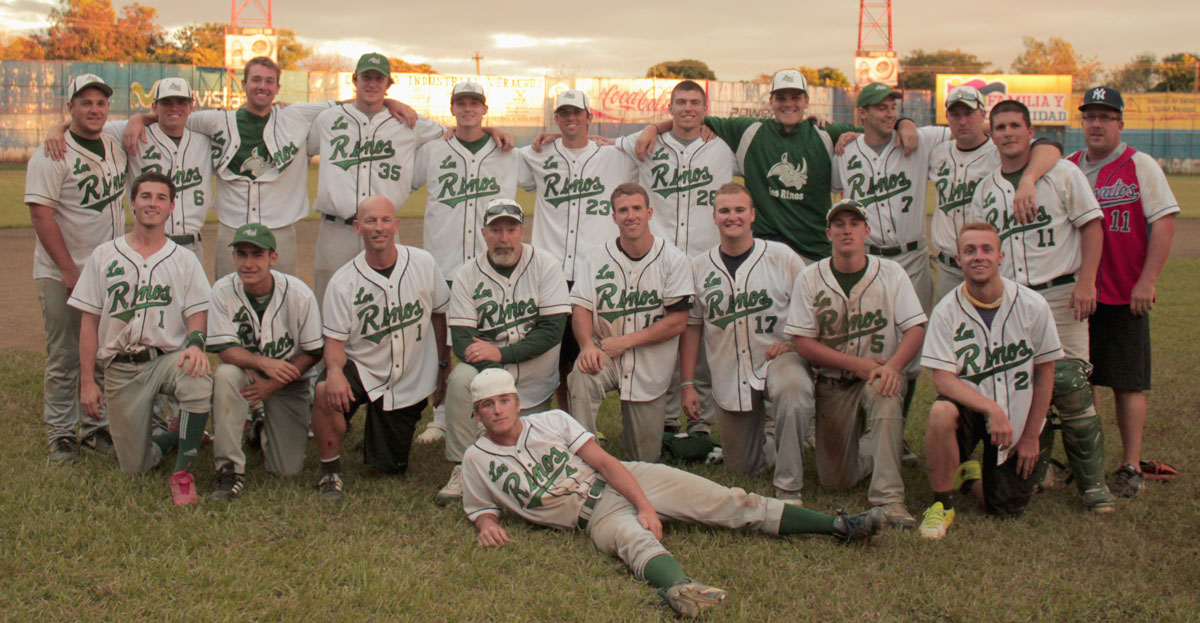
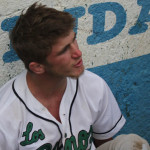
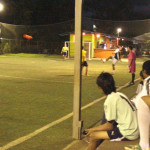
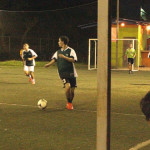
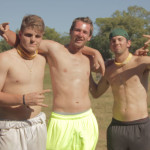
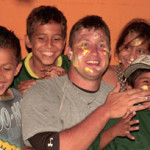
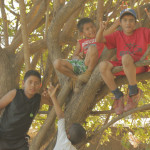
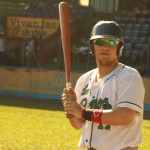
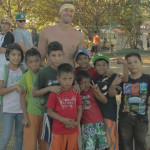
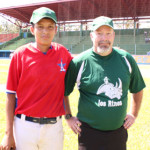
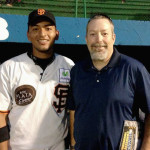
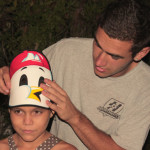
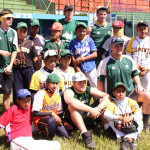
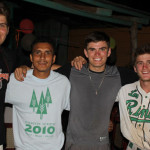
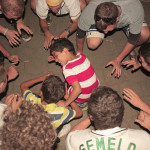
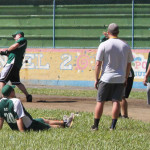
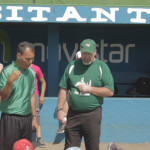
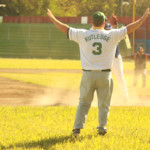
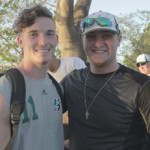
No Comments